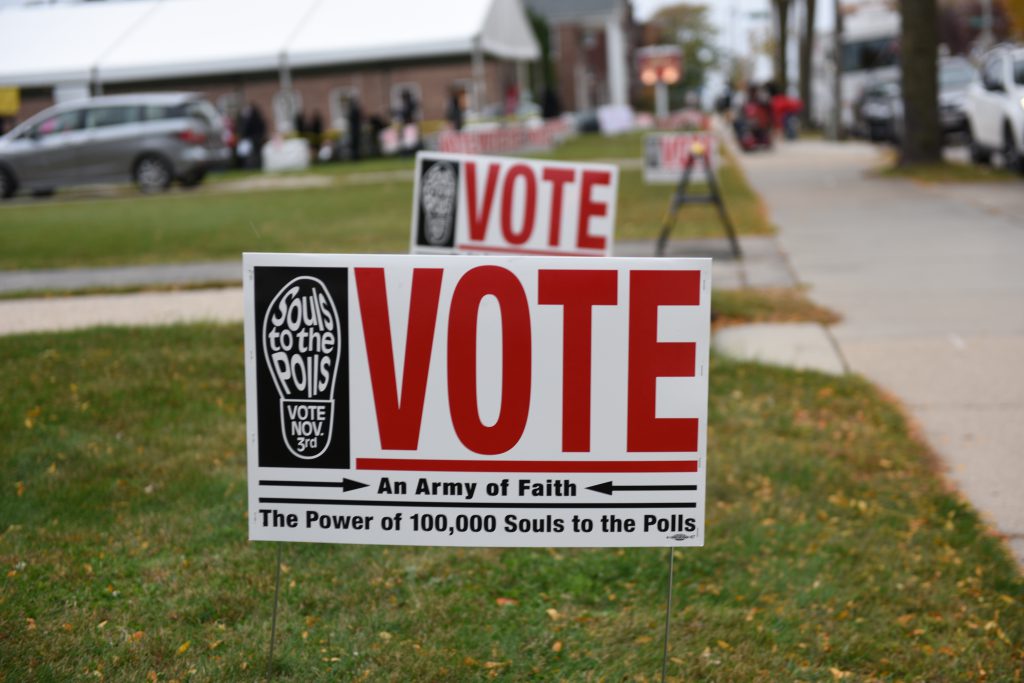Local Resources Help Disabled Voters Cast Ballots
City offers curbside voting and machines designed for people with vision, hearing, physical disabilities.

There are a number of resources available for disabled voters in Milwaukee, including curbside voting and “indefinitely confined” voting. File photo by Sue Vliet/NNS.
For voters with disabilities, it’s not always easy to cast a ballot.
But Barbara Beckert of Disability Rights Wisconsin is trying to change that.
Beckert, director of the organization’s Milwaukee office, works to ensure that disabled voters aren’t disenfranchised in the state.
Beckert and her organization normally audit polling places on Election Day with a checklist to ensure they are truly handicap accessible. This year, because of the pandemic, these audits are canceled. Beckert said there will still be accessibility checklists given to poll workers Nov. 3.
Beckert also works to connect disabled voters with resources they may need to complete the voting process.
She said the organization has trained thousands in Wisconsin, including nursing home staff and caregivers, to assist disabled voters.
Help for ‘indefinitely confined’
One of the resources available to disabled voters is the option to qualify as “indefinitely confined.”
Beckert said many older or disabled voters don’t drive or have driver’s licenses. This makes the lack of requirement for a photo ID especially important.
“They’re at high risk for COVID-19,” Beckert said. “Getting out to get a photo ID for voting right now is very tough.”
Curbside voting
Beckert also said curbside voting is available to anyone who cannot enter the polling place because of a disability. State law requires that curbside voting be available at all polling locations.
Anyone who plans to vote curbside in Milwaukee can call 414-286-3693 on Election Day. Beckert encouraged voters who plan to use this service to phone ahead. Curbside voting also is available for early voting at all polling places.
For voters in other parts of the state, Beckert said they should contact their municipal clerk. Voters can find their municipal clerk on this webpage.
Beckert also said a car is not required for curbside voting.
“Not everyone is going to be driving up,” Beckert said. “Some people will be coming in a power chair and some people will be walking.”
Special voting machines
Beckert said there are special, accessible voting machines with special keyboards that can be used for people who need assistive technology. For instance, a blind person can use the assistive technology to have the ballot read to them so they can cast a vote.
In Milwaukee, these are AutoMark machines that are available to people with vision, hearing or physical disabilities.
Every polling place in Milwaukee has an AutoMark machine. People with disabilities who vote in person can also request assistance from poll workers.
Beckert said that it’s important for people with disabilities to be able to be independent and cast their own ballot. She’s heard stories about people who don’t want family members to fill out ballots for them because they don’t share the same political beliefs.
Resources available
Disability Rights Wisconsin Vote Hotline: 844-DIS-VOTE / 844-347-8683
Wisconsin Election Commission Accessibility Information for Clerks
Wisconsin Disability Vote Coalition Disability Vote Coalition 2020 Elections Voting FAQ
This story was originally published by Milwaukee Neighborhood News Service, where you can find other stories reporting on fifteen city neighborhoods in Milwaukee.





















